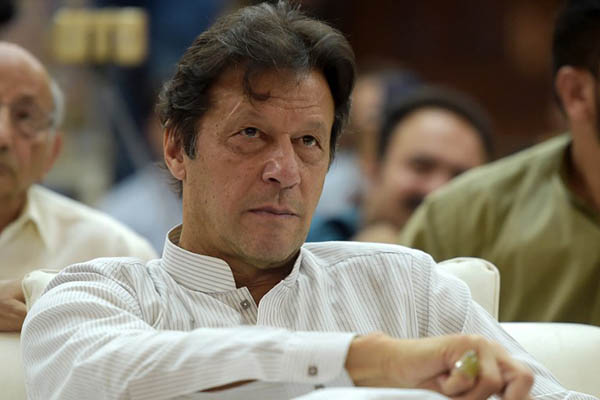
Aamir Qureshi—AFP
Critics see deal requiring Aasia Bibi to remain in Pakistan until final review of her acquittal as yet another capitulation to religious hardliners
Prime Minister Imran Khan will return home to a deepening political crisis on Monday, with pressure mounting over a deal struck with Islamists hardliners that analysts say has eroded faith in his government.
Khan spent the last four days on a state visit to China, trying to win some desperately needed relief for his country’s parlous finances, as his homeland fractured over the fate of Aasia Bibi—a Christian woman cleared of blasphemy charges last week by the Supreme Court.
The overturning of her conviction, which Pakistan’s top judges ruled was based on flimsy evidence, ended Bibi’s eight-year ordeal on death row. But it enraged Islamists hardliners who took to the streets, blockaded major cities and demanded her immediate execution.
Blasphemy is an incendiary charge in Muslim-majority Pakistan, where even the whiff of an unsubstantiated allegation of insulting Islam can spark death at the hands of mobs. The protests were only brought to an end once Khan’s administration agreed to a deal with the hardliners, where Bibi would remain in Pakistan while a final review of the Supreme Court’s ruling takes place.
Many critics saw the climb-down as another capitulation to Islamist hardliners who called for the assassination of the country’s Supreme Court justices and mutiny against the Army’s top brass in the ruling’s wake.
“The government seems to be directionless and it does not seem to have a proper strategy,” said analyst Fasi Zaka. “The government has just bought time and we’re still waiting to see what they do.”
Only a few days earlier, Khan had been riding a wave of positive energy. Shortly before his departure for China he delivered a speech vowing to confront the protesters head on, winning widespread praise from those detractors who had long accused him of courting extremists and for defending the blasphemy laws.
The protests calling for Bibi’s execution were being headed by the Tehreek-e-Labaik Pakistan party (TLP), which is known for whipping up anger over blasphemy and successfully achieved a minister’s resignation under the previous administration in 2017 by blockading roads into Islamabad for more than three weeks.
Many critics of Khan noted that it was the second time his young administration had folded to Labaik demands after his government sacked an economics adviser belonging to the persecuted Ahmadi religious minority following pressure from its outspoken leader Khadim Hussain Rizvi. “Khan may have won the election, but it is Rizvi who seems to be ruling Pakistan today,” wrote columnist Fahd Husain in an editorial published in the English daily Express Tribune over the weekend. “The government must act against the TLP to sustain its popularity,” added security analyst Amir Rana. “The government looks weak and fragile.”
The deal has left Bibi in legal limbo and her family fearing for her safety. Her husband has appealed for Britain or the United States to grant the family asylum while her lawyer has fled overseas.
Khan’s first wife, British activist and filmmaker Jemima Khan, joined the chorus chiding the premier for backing down, saying his administration had effectively signed Bibi’s “death warrant.”
“Not the Naya Pakistan we’d hoped for. 3 days after a defiant & brave speech defending the judiciary, Pakistan’s gov caves in to extremist demands to bar #AsiaBibi from leaving Pak,” she tweeted on Sunday.
The government continued to defend the deal on Monday, saying the agreement had averted violence. “We dispersed them in a peaceful way which is an achievement,” Information Minister Fawad Chaudry told reporters.
Analysts said Khan’s government had little strategy in place for following through on the vow to confront the protests, which were quickly snowballing. “I think there’s a huge fear of a backlash,” said analyst Zahid Hussain, adding that the Army also did not appear to support a potential crackdown.
Adding to the weekend’s woes, Khan appeared to be returning from traditional ally China empty-handed as he tries to reduce the amount of funds Pakistan will likely seek from the International Monetary Fund in bailout talks.
A statement released late Sunday hinted at new assistance from the Chinese but made no mention of the billions the government had been hoping to secure. “The prime minister is facing a real problem as he went to China to get an aid package, but he was given a cool reception,” said Zaka. The reception that awaits him on return might get much hotter.
